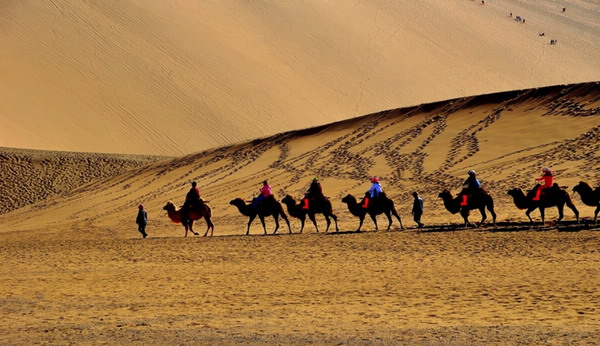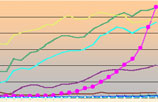One Belt, One Road for foreigners
By kellivschina (blog.chinadaily.com.cn) Updated: 2015-04-17 17:23
|
 |
|
Tourists ride camels on the Mingsha Sand Dunes during a visit to Crescent Moon Spring on the outskirts of Dunhuang county. [Photo by Fan Chen] |
I’ve never been “that person” who is always trying to get friends’ opinion on the latest political happenings. I don’t usually find myself in political conversations because either a) I find them boring or b) they end up turning into arguments, neither of which really suits my fancy.
But I do still try to keep up-to-date on what’s happening in the world and especially in my country (after all, if I’m going to be casting a vote next year for a new president, I prefer to be an educated voter). Since I currently live in a different country from the one where I have citizenship, I also try to keep an eye on the political scene here in China.
Recently there’s been a lot of talk about the “One Belt, One Road” initiative. In case you haven’t heard of it or don’t know the details, here’s a brief and easy-to-digest summary of what I’ve gleaned about this issue. For those who are not politics-friendly, don’t worry; it’s pretty basic. So, here’s your “One Belt, One Road for Dummies.” [Not that I think any of you are dummies. Don’t take it personally.]
WHAT IS IT?
Ever heard of the Silk Road? It was an ancient and very economically significant trade route across Asia. The new belt and road project, introduced in September 2013 by President Xi Jinping, is an attempt to recreate this bustling trade route. Granted, it’s not going to follow the exact same trade route as the ancient Silk Road. In fact, there are actually two “routes” that are currently in progress. One is a land route that will stretch across central Asia and into Europe. Another is a more far-reaching maritime route that will link China with countries in Southeast Asia, Europe, and even Africa.
WHAT’S THE PURPOSE?
Like the ancient Silk Road, the new “One Belt, One Road” will have huge economic advantages for China as well as for the other countries that join in. If successful, this initiative has the power to shift the center of the world’s economic activity to Asia, as well as provide Asian countries with the resources they need to continue developing. More than just an economic maneuver, President Xi Jinping has also made this an issue of foreign policy by promising that the creation of this new road will allow China to offer more economic support to other countries in Southeast Asia.
WHY DOES IT MATTER?
I’ll admit that this bit of information isn’t quite as exciting for young 20-somethings like me as the fact that Emma Watson will play Belle in a new live-action Beauty and the Beast. But the fact is that this undertaking is huge; it involves 65 countries, more than 4 billion people, and will cost the equivalent of at least 40 billion US dollars. For a country that hasn’t been “open” to international business of this kind for many decades, China has undertaken a project that will change the way the world does business. It’s also significant to note that the proposed route will run right through areas of the world that have been engaged in tumultuous war for years and will probably have a huge effect on the political scene in those countries.
HOW ARE WESTERN COUNTRIES RESPONDING?
Unsurprisingly, when it was first proposed, other nations’ leaders were hesitant. They understand just how much this move will boost China’s economic standing in the world and while it promises to benefit them as well, it’s always risky entering into an agreement like this. Although the new road won’t actually touch my home country, the United States hasn’t been totally gung-ho about belt and road initiative. Why? Oh, you know, we like feeling like we’re the biggest and toughest in the world. (Remember how I signed up for a wilderness survival class in college to prove my toughness?) To the US, it feels a lot like China is trying to knock the country down from its dominant position in the international economy. Most European nations are currently on board with the plan and have actually expressed confidence that this new road will not only have positive effects on Asia but on the global economy as a whole.
While I obviously haven’t studied the issue enough to know all of the ins and outs, I think it’s impressive that China is finally stepping out and making its first mark in the global financial market. Over the last few months, I’ve been thinking a lot about China’s status as a “developing” country and have become surprisingly excited about seeing its progress. If this type of economic growth will eventually raise the living standard of the people that I’ve come to love so much, then I’m all for it.
The original blog is at: http://blog.chinadaily.com.cn/blog-2067524-28218.html











